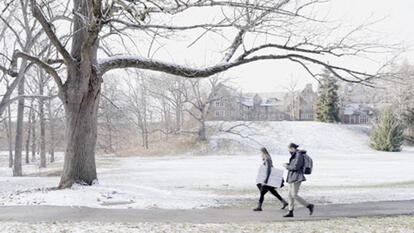Alumna Activist is Keynote Speaker for Campus Mini-Conference on Social Justice

At a time when activism is growing across the country, including the recent grassroots women’s marches, the College has organized a half-day mini-conference on social justice and activism that will take place Monday, January 23, from noon to 5 pm in Pendleton Hall. Entitled Together Toward the Dream, the conference will include discussions and skills-building workshops led by faculty, staff, and alumnae as well as leaders from local community organizations.
“We created this conference because we know our students aren’t waiting until after they graduate to make a difference in the world,” said Carol Bate, interim dean of students. “But we also know many students want advice, inspiration, and basic tips on how to take part in activism. One of the mini-conference’s central goals will be to give students a toolbox of concrete skills they can put into practice immediately. We think this will be both a learning experience and a motivating catalyst.”
The keynote lecture, “A Seat at the Table: Stories from an Activist,” will be given at 4 pm by Elizabeth “Liz” Miranda ’02, an entrepreneur and community builder. (This year she begins a new venture called Amplify Boston, “where Boston’s communities of color will have the platform to shine.”) To preview some of the many issues that will be explored at Monday’s conference, Miranda participated in this Q&A, offering information and insight on how to approach activism.
Q: Many of us feel almost hopeless in the face of great change. When there is such polarization socially and politically, is there any way to have your voice heard? Is there any way to make a difference?
Miranda: Often in times of great change, the voices of the people are the loudest, the most powerful. We can think about the fight to end slavery, the women’s suffrage movement, protests against the Vietnam War, Jim Crow, and the fight for marriage equality. To make a difference, do not lose hope. You can absolutely make your voices heard. In fact, right now is the perfect time to make noise and to lift the voices of those still unheard. You just have to speak up and extend a hand across the table. If you want to be involved, show up. If you don’t know what to do, say so. Be willing to create an opportunity, if you don’t see one. Don’t be afraid. A movement doesn’t need perfection; it needs authenticity.
Q: Your work joins entrepreneurship, entertainment, and activism. What are some ways students can begin looking for roles and activities in activism that feel right for them and that connect with their interests?
Miranda: Insert yourself. Serve to learn. Affirm who you are, first. The rest will follow.
Q: Can you give us a preview of the most important piece of information you will share during your keynote address?
Miranda: I believe there are many important messages in my keynote that are worthy to share with you all. However, I do believe that the most important thing in my speech other than reminding us all that “we are enough,” is that you must use your own seat to create more seats at the table…for others who are different than you. We cannot be drum majors for justice by ourselves and in our own little boxes.
Q: Of course, there are many ways to protest injustice and inequity. What are some first steps someone can take when planning to become active? Are there basic tools that can help?
Miranda: If you are planning to be a more active and engaged citizen, first understand that you are already activated. Choosing an institution of this esteem—for the higher learning of women who will make a difference in our world—was a conscious and deeply important decision. (Even if Wellesley chose you first.)
There are some basic steps and tools: Be brave. Challenge your place in the world and your understanding. Most of us are products of what we experienced as children; we were taught to be willing to accept that much of what we were taught could in fact be wrong, or not sufficient in its truth. So you may need to learn more—and unlearn at the same time. Then, use what’s in your hands (your “personal toolbox”) as well as what makes your heart beat…to forge your cause and how you share that cause. In other words, start with you.
Q: You were very active leader while at Wellesley. What is the one piece of advice you would give your younger self if you could send a message back in time?
Miranda: I would tell her to be more of a bridge. I felt very different and alone for most of my Wellesley experience. It is what drove me to be so active, so that I could hear and see myself figuratively and literally in our space. I got involved in Student Life and brought speakers and talent like Joan Morgan, Amiri Baraka, and The Roots to campus. I became a resident advisor to show other Wellesley women, we were here. I worked with Admission to recruit differently and to uplift the histories of the marginalized. I did it, I thought at the time, to change Wellesley, but I learned a decade later that I was affirming who I was.
With maturity and understanding I have learned that, if I had learned to be a better bridge, I would have impacted so many more people who came from varying viewpoints and lifestyles.
Monday’s conference is sponsored by the Office of the Dean of Students and co-sponsored by the Office of Religious and Spiritual Life and Community Engagement, in collaboration with Wellesley Plus. Students who are interested in attending should plan to register early as space is limited



